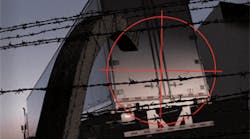Reducing cargo theft and beefing up anti-terrorism tactics are going to require a much more international approach in the near future in order to improve effectiveness, according to cargo security experts.
“Terrorism and [cargo] theft are a global problem that requires international cooperation and collaboration to combat effectively,” said David Jones, vp of security for clothing maker Tommy Hilfiger and outgoing chairman of the newly renamed International Cargo Security Council (ICSC).
“Some 10-million cargo containers are transported on vessels into U.S. ports every year, and million of tons more [of cargo] arrive by air, trucks and rail,” he said during a recent press conference in Washington D.C. to announce the Annapolis, MD-based ICSC’s name change. “We must collaborate with our colleagues in all countries to ensure safe and secure movement of global commerce.”
Jones added that cargo theft remains a growing problem both in the U.S. and abroad, with shippers and carriers alike finding it difficult to get their arms around the problem. “Cargo theft represents between $16 billion and $30 billion in losses per year in the U.S., with Europe suffering an equal burden,” he told Fleet Owner. “The way we’re going to really get our arms around this issue is to formulate a more international effort, working more closely with our counterparts in [cargo] security around the world.”
To help facilitate more global cargo security efforts, the ICSC just opened its first international chapter in Europe – a chapter that will eventually include Africa and the Middle East -- and plans similar chapters for Asia and South America in the near future, said Joe Baker, the group’s executive director.
Jones added that security is increasingly becoming a key “litmus test” for shippers in terms of which transportation providers they use to handle their cargo – including motor carriers.
“The key making cargo security efforts acceptable to the small operator,” he told Fleet Owner. “We need to not only tell the little guy what they need to do in order to have an acceptable minimum level of cargo security, but we need to tell them why it’s needed and how we can help them get there. All the [security] regulations in the world won’t be effective without the buy-in of the business community.”
Mark Nelson, communications director for tracking technology provider Savi Technology, added that the key to getting wider adoptation of security technology by U.S. trucking firms is to clearly illustrate the added benefits such technology can give them – especially when it comes to improving operational efficiency.
“They have to gain extra capability by adopting security technology – that’s the major selling point going forward,” he told Fleet Owner. “Our challenge is to prove that there’s a real business ROI [return on investment] for the extra cost of security systems, in terms of reduced liability, cost of cargo claims, improved efficiency and customer service, etc. No one wants to add more cost to their business without gaining some extra capability with it.”




